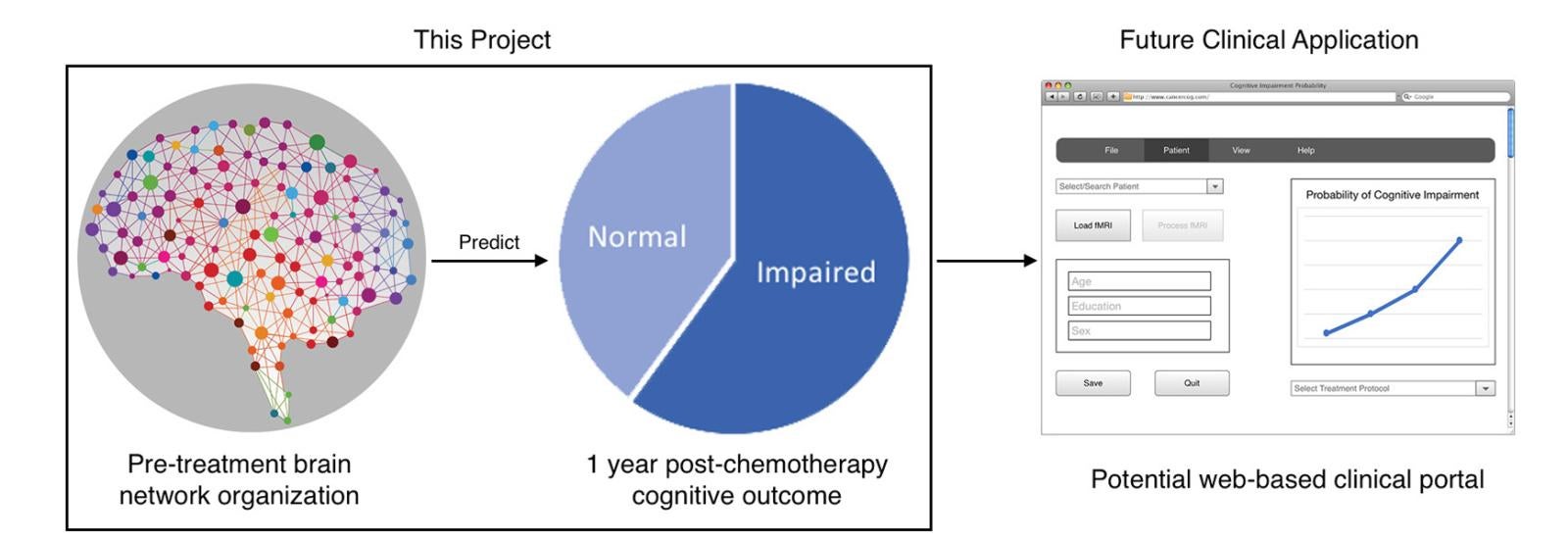Study Overview
The purpose of the PAC-AI study is to learn more about the brain and cognitive changes that occur following diagnosis and treatment for breast cancer. We will use neuroimaging and machine learning, a type of artificial intelligence, to predict which patients are at highest risk for chemotherapy-related cognitive impairment.
We are currently recruiting newly diagnosed patients with breast cancer who have not yet begun chemotherapy, breast cancer survivors who have completed chemotherapy and healthy female volunteers age 35-68 years to help us understand how chemotherapy affects thinking and memory!
The PAC-AI research study is funded by the National Cancer Institute of the National Institutes of Health (Grant Number R01CA226080) and is a collaboration with the Cancer Survivorship Research Team at Stanford University.

Participation Eligibility
Participants must meet all of the following eligibility requirements:
- In order to participate, you must be a woman newly diagnosed with breast cancer OR a breast cancer survivor OR a woman with no history of cancer.
- If you are a woman with breast cancer, you either have not yet begun your chemotherapy treatment OR you completed chemotherapy treatment at least 6 months ago
- If you are a woman with no history of cancer, you must be in good health with no major medical or psychiatric conditions.
- You must be 35-68 years of age.
- You must be able to read and speak English.
- You must have a computer with internet access.
- You must be free from MRI contraindications such as metallic implants (e.g. pacemaker, certain orthopedic pins/plates), metallic tattoos or claustrophobia.
- You must be free from any major sensory deficits (e.g. blindness, deafness).
- You must be willing to travel to UT Austin for two study visits.
Study Procedures
If you are newly diagnosed with breast cancer, you will be asked to complete 2 study visits: prior to beginning treatment and again one year after completing chemotherapy (approximately 1 year after the first visit). If you are a breast cancer survivor who has completed chemotherapy OR a woman without cancer, you will be asked to complete 2 study visits: at enrollment for the study and again approximately 1 year later. At each study visit, we will ask you to complete the following procedures:
- MRI Scan: We will obtain a magnetic resonance image (MRI) scan of your brain. MRI uses magnetic fields to take pictures of your brain’s structure and function. There are no injections, radiation, or harmful effects involved. The scan will take about 40 minutes.
- Cognitive Testing: Computerized tests that measure thinking, memory and attention skills. These tests will take about 15 minutes.
- Questionnaires: Questionnaires that ask you to rate your sleep, mood, distress and energy levels and one that asks you regarding your medical history. This will take about 1 hour.
You will receive a $75 e-gift card at the end of each visit and a parking pass will be emailed to you prior to each MRI visit.
Contact Information
Director: Shelli Kesler, PhD
Please contact us to discuss how you can participate by emailing at kesler.lab@austin.utexas.edu.
FAQs
COVID-19 Considerations
We will ask you to complete a questionnaire regarding COVID-19 symptoms when scheduling your MRI visit and again on the day of the visit. If you have any symptoms such as fever, cough, shortness of breath, sore throat, etc., we will need to reschedule your visit.
Our research staff, including the MRI technologist, will also be screened for COVID-19 symptoms on the day of your MRI visit. You will be escorted to the MRI suite by one of our research staff while maintaining at least 6 feet of social distance. You will be required to wear a face mask for the duration of the visit and research staff will also be wearing a face mask.
At the MRI suite, the MRI technologist will assist you into and out of the MRI scanner. This will require approximately 10 total minutes of close contact. There will be no other close contact during your visit. The MRI suite is disinfected thoroughly before and after each visit following established University protocols.
Please see Protect Texas Together for more information regarding the University’s COVID-19 related policies, practices and guidelines.
What is MRI?
Magnetic resonance imaging, or MRI, is a non-invasive technology that allows us to visualize internal structures in the body. Our work focuses on brain MRI which provides images of brain structure and also allows us to measure brain function. MRI uses strong magnetic and radiofrequency fields. It does not involve any radiation or other harmful effects but you should not undergo MRI if you have certain medical implants that are metallic.
What are cognitive tests?
These are tests of cognitive skills including memory, thinking, attention and problem solving. These tests are done online using your home computer. It is important that you do the tests in a quiet area free from distractions. A member of our research staff will be available to assist you with any difficulties.
What is machine learning?
Put simply, machine learning is a way to analyze data. It is a type of artificial intelligence because a computer program “learns” important patterns within data to create algorithms that diagnose conditions or predict outcomes. We are using machine learning to diagnose cognitive impairment and predict which patients are at highest risk for these impairments.


